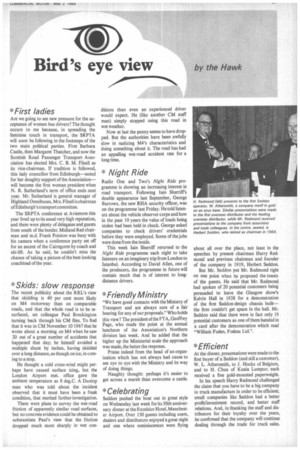Bird's eye view
Page 89

If you've noticed an error in this article please click here to report it so we can fix it.
by the Hawk *First ladies
Are we going to see new pressure for the acceptance of women bus drivers? The thought occurs to me because, in spreading the feminine touch in transport, the SRPTA will soon be following in the footsteps of the two main political parties. First Barbara Castle, then Margaret Thatcher, and now the Scottish Road Passenger Transport Association has elected Mrs. C. B. M. Filsell as its vice-chairman. If tradition is followed, this lady councilor from Edinburgh—noted for her doughty support of the Association— will become the first woman president when N. R. Sutherland's term of office ends next year. Mr. Sutherland is general manager of Highland Omnibuses, Mrs. Filsell is chairman of Edinburgh's transport committee.
The SRPTA conference at Aviemore this year lived up to its usual very high reputation, and there were plenty of delegates and guests from south of the border. Midland Red chairman and m.d. Frank Pointon was busy with his camera when a conference party set off for an ascent of the Cairngorm by coach and ski-lift. As he said, he couldn't miss the chance of taking a picture of the best-looking coachload of the year.
*Skids: slow response
The recent publicity about the RRL,'s view that skidding is 40 per cent more likely on M4 motorway than on comparable roads, and that the whole road is to be resurfaced, set colleague Paul Brockington turning back through his CM files. To find that it was in CM November 10 1967 that he wrote about a morning on M4 when he saw 20 out of a great number of accidents that happened that day; he himself avoided a multiple shunt by inches, having skidded over a long distance, as though on ice, in coming to a stop.
He thought a cold cross-wind might perhaps have caused surface icing, but the London Airport met. office gave the ambient temperature as 8 deg.C. A Dunlop man who was told about the incident observed that it must have been a freak condition, that merited furtherinvestigation.
There were plans to survey the wet-road friction of apparently similar road surfaces, but no concrete evidence could be obtained to substantiate Paul's view that the friction dropped much more sharply in wet con
ditions than even an experienced driver would expect. He (like another CM staff man) simply stopped using this road in wet weather.
Now at last the penny seems to have dropped. But the authorities have been awfully slow in realizing M4's characteristics and doing something about it. The road has had an appalling wet-road accident rate for a long time.
* Night Ride
Radio One and Two's Night Ride programme is showing an increasing interest in road transport. Following lain Sherriff's double appearance last September, George Burrows, the new RHA security officer, was on the programme last Friday. He told listeners about the vehicle observer corps and how in the past 10 years the value of loads being stolen had been held in check. George asked companies to check drivers' credentials before they were employed. Some of the jobs were done from the inside.
This week lain Sherrill* returned to the Night Ride programme each night to take listeners on an imaginary trip from London to Istanbul. According to David Allen, one of the producers, the programme in future will contain much that is of interest to longdistance drivers.
* Friendly Ministry
"We have good contacts with the Ministry of Transport and are always sure of a fair hearing for any of our proposals." Who holds this view? The president of the FTA, Geoffrey Page, who made the point at the annual luncheon of the Association's Northern division last week. And he added that the higher up the Ministerial scale the approach was made, the better the response.
Praise indeed from the head of an organization which has not always had cause to see eye to eye with the Ministry and its way of doing things.
Naughty thought: perhaps it's easier to get across a marsh than overcome a castle.
*Celebrating
Seddon pushed the boat out in great style on Wednesday last week for its 50th anniversary dinner at the Excelsior Hotel, Manchester Airport. Over 150 guests including users, dealers and distributors enjoyed a great night and one where reminiscences were flying about all over the place, not least in the speeches by present chairman Harry Redmond and previous chairman and founder of the company in 1919, Herbert Seddon.
But Mr. Seddon put Mr. Redmond right on one point when he proposed the toasts of the guests. He said that Mr. Redmond had spoken of 20 potential customers being persuaded to leave the Glasgow show's Kelvin Hall in 1938 for a demonstration of the first Seddon-design chassis built— the firm couldn't get space in the hall. Mr. Seddon said that there were in fact only 19 potential customers as one of them handed in a card after the demonstration which read Foden, Fodens Ltd.".
*Efficient
At the dinner, presentations were made to the first buyer of a Seddon (and still a customer), W. L. Athersmith, to J. Hocke of Belgium, and to H. Chua of Kuala Lumpur, each received a fine gold-mounted paperweight.
In his speech Harry Redmond challenged the claim that you have to be a big company in truck manufacture in order to be efficient; small companies like Seddon had a better profit/investment record, and better staff relations. And, in thanking the staff and distributors for their loyalty over the years, he confirmed that the company will continue dealing through the trade for truck sales.




















































































































































































































